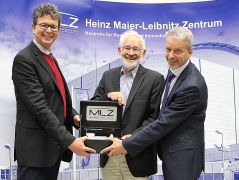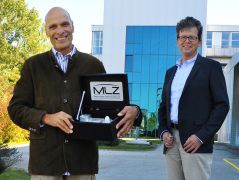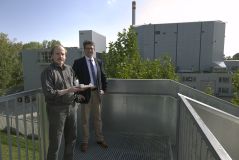MLZ is a cooperation between:
 > Technische Universität München
> Technische Universität München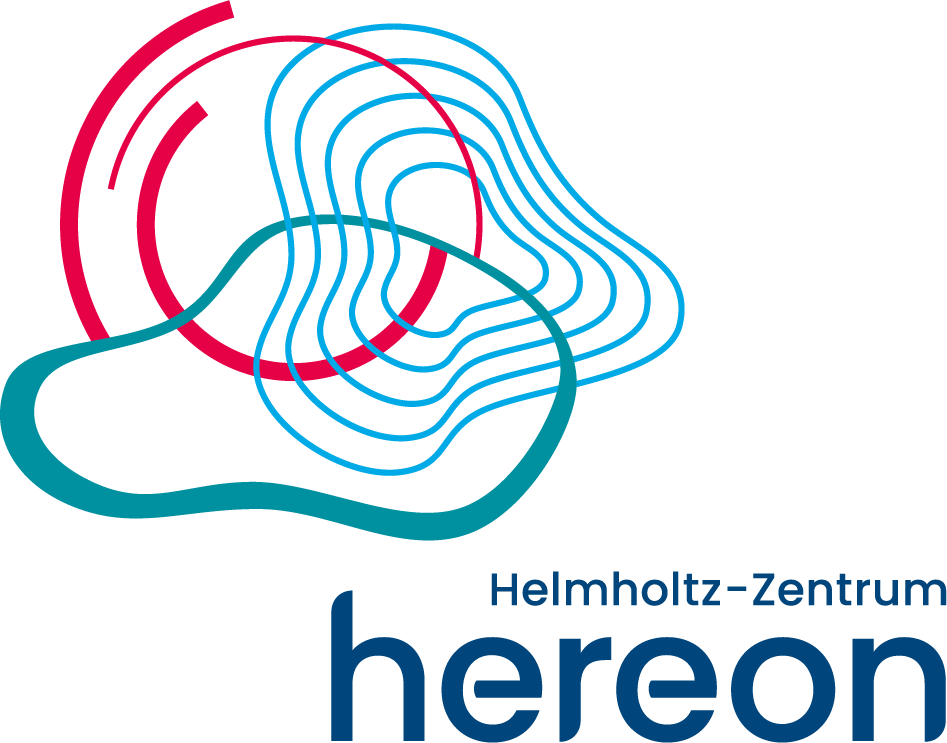 > Helmholtz-Zentrum Hereon
> Helmholtz-Zentrum Hereon
 > Forschungszentrum Jülich
> Forschungszentrum Jülich
MLZ is a member of:
 > LENS
> LENS > ERF-AISBL
> ERF-AISBL
MLZ on social media:

MLZ (eng)
Lichtenbergstr.1
85748 Garching
19.09.2023
Precise turning in three degrees of freedom: MLZ Prize for Prof. Wolfgang Schmahl
This year’s MLZ Prize for Instrumentation and Scientific Use goes to Prof. Dr. Wolfgang Schmahl from the Ludwig-Maximilians-Universität München. He has rendered outstanding services to the construction and operation of the scientific instruments RESI and SPODI.
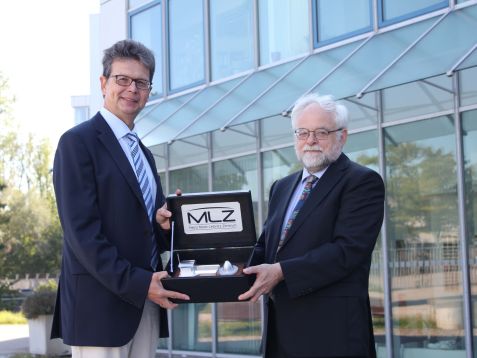
Prof. Peter Müller-Buschbaum (l.) presents Prof. Wolfgang Schmahl (r.) with the MLZ Prize © Reiner Müller, FRM II
Prof. Dr. Wolfgang Schmahl was larger than life at the award ceremony. As he was unable to attend in person, the presentation of the MLZ Prize was recorded. The film was played at the annual meeting of university group leaders at the Heinz Maier-Leibnitz Zentrum in September.
Early involvement in scientific instruments
In his laudatory speech, the Scientific Director of the Heinz Maier-Leibnitz Zentrum (MLZ) and FRM II, Prof. Dr. Peter Müller-Buschbaum, highlighted Wolfgang Schmahl’s early involvement in the FRM II and MLZ: “From the very first days of the FRM II, he was involved in the construction and operation of the RESI and SPODI instruments.”
Successful developments for measuring guests
His field of research, nickel-titanium shape memory alloys, drove Schmahl to make extraordinary developments. For example, his Chair of Inorganic and Biogenic Geomaterials developed a load frame that can be adjusted horizontally and vertically to the incident beam. The load frames, developed over the years by Prof. Schmahl, “are part of the portfolio and are successfully used by many scientists on the STRESS-SPEC and SPODI diffractometers,” said Müller-Buschbaum.
Pioneer in the expert committee
Wolfgang Schmahl has also rendered outstanding services to neutron scattering as an active member of the German Society of Crystallography. He campaigned for further developments here and, according to Müller-Buschbaum, “brought the whole crystallography world to Munich” when he organized two annual meetings of the German Society of Crystallography. Peter Müller-Buschbaum also describes him as a “referee pioneer” because he was one of the reviewers who assessed the first beam time applications for the research neutron source in 2004. Wolfgang Schmahl was an expert on the neutron source’s review panel for the evaluation of beam time proposals for five years.
Commitment to young talent in neutron scattering
Young talent is also close to Wolfgang Schmahl’s heart. “He is one of the driving forces behind the Master’s program MaMaSELF (Master in Materials Science powered by Large Scale Facilities),” says Peter Müller-Buschbaum. Within this program, many students worldwide are given the opportunity to carry out neutron scattering experiments at the MLZ “and thus launch their careers,” says Müller-Buschbaum.
Wolfgang Schmahl was modest and initially expressed his surprise at receiving the award. He thanked the MLZ and, above all, its employees. He is proud of a doctoral thesis by Alexander Heldmann, for example, who wrote the evaluation software for the load frame and used it very successfully. It can rotate extremely precisely in all three degrees of freedom and makes it possible to measure the mechanical properties of steel or titanium alloys, for example. “That was a fantastic achievement by the doctoral student,” said Schmahl, not without thanking the two supervisors at the MLZ, Dr. Markus Hölzel and Dr. Michael Hofmann. The instrumentation at the MLZ and the MaMaSELF project still give Prof. Schmahl “great pleasure.”
Previous winners of the MLZ Prize:
2019: Prof. Dr. Götz Eckold
2020: Prof. Dr. Georg Roth
2021: Prof. Dr. Peter Böni
2022: Prof. Heinz-Günter Brokmeier
Video of the award ceremony:
Watch the recording of the award ceremony on YouTube here
Related News
MLZ is a cooperation between:
 > Technische Universität München
> Technische Universität München > Helmholtz-Zentrum Hereon
> Helmholtz-Zentrum Hereon
 > Forschungszentrum Jülich
> Forschungszentrum Jülich
MLZ is a member of:
 > LENS
> LENS > ERF-AISBL
> ERF-AISBL
MLZ on social media:



